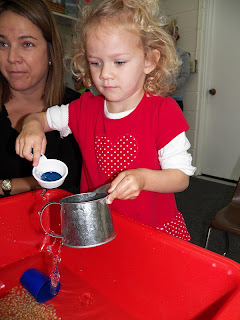Some of you may know
that I am heavily inspired by the Preprimary schools of Reggio Emilia,
Italy. When I speak of “the Italians”,
that is who I am referring to. Reggio
Emilia is not a curriculum or a
method (such as Montessori) but is a CITY in Italy. The preschools there have been regarded as the
best in the world. American educators
have spent the past 2 decades attempting to understand, replicate, and try as
they might, make a curriculum out of it.
It’s so hard for some of us to accept that some things cannot be replicated,
packaged and sold. The Italians often
state to well-meaning early childhood teachers, You cannot copy what we do (we
are in a different country with a very different culture), let us instead inspire
you to use your own community, culture, and image of the child to create
your own interpretation.
I often think about my
own “Image of the child”…
Do I think children are
capable? Or do I find them helpless?
Are children
intentional in their explorations? Or
are they simply incidental and cute?
Are they knowledgeable
or do they need to be filled with knowledge?
Are they self-motivated
and instinctual or do I need to offer motivation and reason?
Do children need moments
of quiet reflection, observation, chaos, and following Mommy around the house??
OR… Do children need to be entertained
and kept busy?
Do children think
deeply or are they only skimming the surface?
Is childhood something to
be cherished and valued or is childhood simply a means by which we get to
adulthood.
Do our children deserve
our respect in the way we respect our fellow adults? Or do they need to be taught respect?
While I want to to say
Yes to all the former sentences…if I am being honest, I do sometimes think the
latter. It’s so much easier as a teacher
to always maintain a strong image of the child and I often wonder how the
parents miss it…But as a Mom myself, I understand how I the parent often revert
back to thinking of my children as helpless, ignorant, and misguided in their
intentions.
But in those times when
I am not respectful of my children, I notice there are more tantrums, whining, aggression,
and opposition. When I realize I have hurried
them (temporally and developmentally), yelled, patronized, etc… I am often left
feeling disappointed in myself and my children.
Those moments are unavoidable
but I do think we can learn from them.
We can learn about ourselves and our children and begin the path to
understanding.
"How Can I Make It Move" or Constructivist Physics...(Chaille and Britain 1997)
Physical knowledge is constructed through the child's action on objects and his/her observation of the object's reaction.
The following Four Criteria must be heavily considered in a teacher's planning of experiences for children...
1. The child must be able to produce the movement by his or her own actions. (Not the Adult doing it for him, or it moves on it's own through batteries, etc...)
2. The child must be able to vary his or her actions. (this one is evident through the child being able to move the gutter, ramps in different positions.)
3. The object must be observable. (the child must correspond his actions and the resulting effect on the object.)
4. The reaction must be immediate. (A time lag in reaction makes that correspondence difficult for the child to construct.)
P.77
People always ask me if a 3 year old can benefit from being in a class with an 18 mos. old and vice versa. Above and below is the perfect example. 3 year old B. is experimenting with the gutters and balls. He is eager to observe the reaction of the balls as they hit the ramp. Younger girl, L. comes along and causes variations in his experiment. She moves the gutter around as well as choosing different scenarios with the balls. He is forced to vary his actions as well as able to observe the reactions she receives from her actions. Not to mention the social graces he shows when she interrupts his play. We know it is not an interruption but an invitation for deeper learning.






















































No comments:
Post a Comment